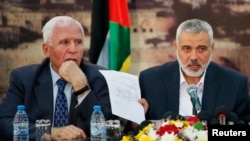The Hamas Islamic militant movement that controls the Gaza Strip announced Saturday that it had chosen its former Gaza prime minister, Ismail Haniyeh, as the group's new political chief.
Haniyeh succeeds Hamas' longtime exiled leader, Khaled Mashaal, and the move comes shortly after Gaza's rulers unveiled a new, seemingly more pragmatic political program aimed at ending the group's international isolation.
Hamas is trying to rebrand itself as an Islamic national liberation movement, rather than a branch of the pan-Arab Muslim Brotherhood, which has been outlawed by Egypt. It has also dropped explicit language calling for Israel's destruction, though it retains the goal of eventually "liberating" all of historic Palestine, which includes what is now Israel.
Hamas has ruled Gaza since 2007, after securing an overwhelming victory in legislative elections the previous year and ending 40 years of political domination by its rival Fatah party. Hamas captured the coastal strip by violently overthrowing forces loyal to the Fatah movement, led by Western-backed Palestinian President Mahmoud Abbas.
Israel, along with Egypt, has been enforcing a crippling border blockade against them since then. Though it has softened some of its rhetoric, Hamas' new platform clung to the hard-line positions that led to its isolation. The group reaffirmed it would not recognize Israel, renounce violence or recognize previous interim Israeli-Palestinian peace deals — the West's long-standing conditions for dealing with Hamas.
In its founding charter, Hamas called for setting up an Islamic state in historic Palestine, or the territory between the Mediterranean Sea and the Jordan River, which also includes Israel. It also included anti-Jewish references.
Attacks on Israel
Over the years, Hamas has carried out shootings, suicide bombings and rocket attacks against Israel. Since 2008, Israel and Hamas militants in Gaza have fought three cross-border wars. Abbas has been an outspoken opponent of violence, saying it undercuts Palestinian interests. Repeated reconciliation efforts between the Palestinian factions have failed. Hamas has sharply criticized Abbas' political program, which rests on setting up a Palestinian state in the West Bank, Gaza Strip and East Jerusalem, lands Israel captured in the 1967 Mideast War.
Haniyeh's selection marks the final phase of the secretive Hamas elections.
In February, the group chose militant commander Yehiya Sinwar, one of its most hard-line figures, as its new Gaza chief in charge of the group's core power base.
Haniyeh, 54, was born in the al-Shati refugee camp in Gaza. He was the private secretary of Hamas' founder and spiritual leader, Ahmed Yassin.
In 2006, after Hamas won the legislative elections, Haniyeh was chosen by the movement to form its first government. He resigned as prime minister after Hamas and Fatah agreed to form a unity government in 2014 — a government that has never taken hold.
For the past four years, he has served as Mashaal's deputy.
Hamas-Fatah friction
Haniyeh's first task will be to cope with escalating tensions between Hamas and Fatah. In recent weeks, Abbas has threatened to exert financial pressure, including cutting wage payments and aid to Gaza, as a way of forcing Hamas to cede ground.
Gaza resident Rani Abu Samra said he hoped Haniyeh's election could bridge gaps with Fatah and mark "a new beginning for a real reconciliation on the internal Palestinian level."
In Gaza, where Haniyeh still resides in his home in a refugee camp, some residents saw his election as a sign that could draw attention to the territory's woes.
"If someone is from outside Gaza, he won't talk about Gaza's ordeals and worries properly," said Ahmed Okasha, a Gaza vendor.
Since quitting his longtime base in Damascus in 2012, Mashaal has mostly lived in lavish suites in the capital of the oil-rich gulf state of Qatar.
Mkhaimar Abusada, a professor of political science at Gaza's al-Azhar University, said Haniyeh was a natural successor to Mashaal and represented "a continuation for the moderate line in Hamas."
Israel had no immediate comment.










